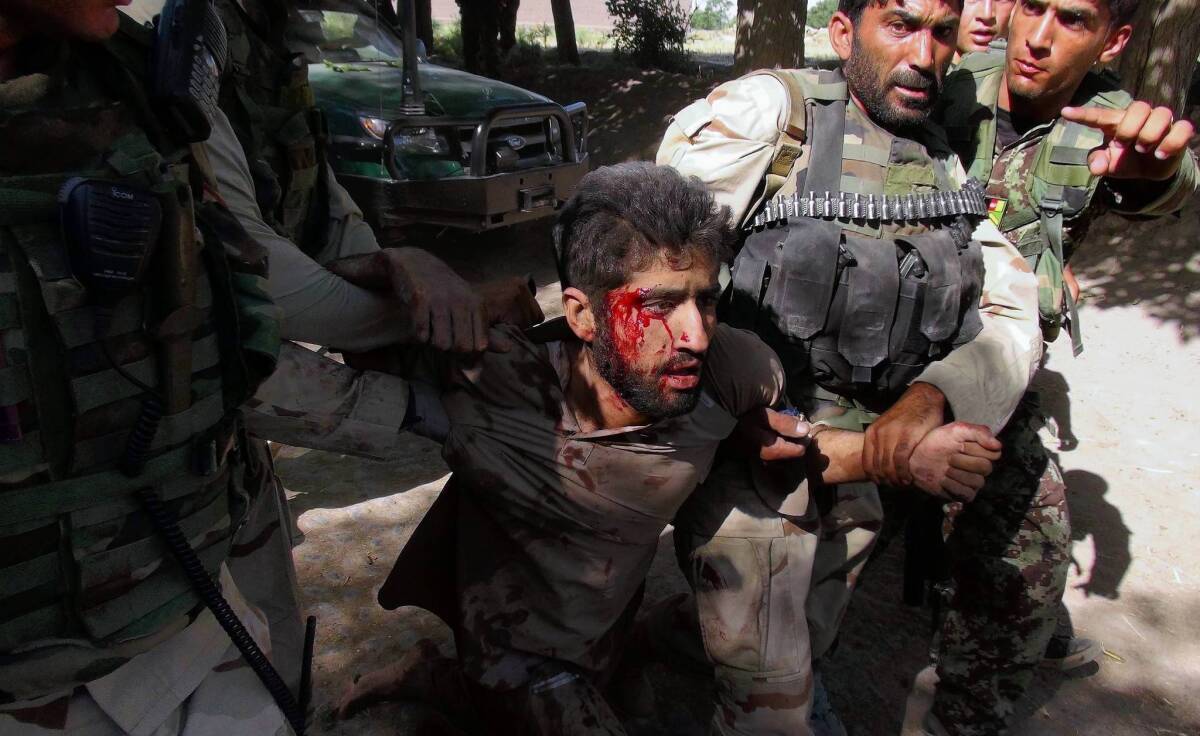Afghan president cancels security talks with U.S.

- Share via
KABUL, Afghanistan — Afghanistan’s president abruptly canceled ongoing security negotiations with the U.S., with his office charging Wednesday that the Obama administration had said one thing and done another while arranging peace talks with the insurgent Taliban movement.
President Obama quickly rejected the criticism, saying, “We had anticipated that at the outset there were going to be some areas of friction, to put it mildly, in getting this thing off the ground.”
President Hamid Karzai’s reputation in Washington as a mercurial U.S. ally was further reinforced by his administration’s decision, which came a day before U.S. officials were scheduled to begin direct negotiations with the Taliban. Analysts said the announcement suggested that Karzai was miffed over being excluded from initial meetings between Washington and the insurgents.
In a terse statement, the Afghan president’s office said the government would stop participating in the security talks because of a “contradiction” between U.S. words and deeds on the peace process.
In a second statement a few hours later, it said Afghan officials wouldn’t attend the separate negotiations with the Taliban planned in the Persian Gulf nation of Qatar until they were “fully Afghanized” and that the opening of a Taliban political office Monday in Doha, the Qatari capital, undermined earlier assurances from the United States.
The statement didn’t say what those assurances were or how long the suspension would last. The security talks are aimed at defining the U.S.-Afghan relationship after American-led foreign forces’ departure from Afghanistan, scheduled for the end of next year.
Obama said misunderstandings aren’t surprising given the enormous mistrust between the Afghan government and the Taliban, but it was still important to explore opportunities for a political reconciliation.
“Not only have the Taliban and the Afghan government been fighting for a long time, they’re fighting as we speak,” he said at a news conference in Berlin with German Chancellor Angela Merkel. “We’re in the middle of a war. And Afghans are still being killed and, by the way, members of the international forces there are still being killed. And that’s not abating as we speak.”
Underscoring his point, four Americans were killed in a Taliban rocket attack on Bagram air base in eastern Afghanistan late Tuesday just as Obama was announcing negotiations with the insurgent group in an “important first step” toward reconciliation. The Taliban said in a statement that its fighters fired two missiles.
The Afghan government earlier outlined conditions it wanted Washington to insist on before the Taliban talks, which an Obama administration official said would begin Thursday. Those conditions included a commitment by the insurgent group to communicate with the Afghan government, acknowledge the legitimacy of the Afghan Constitution and renounce violence.
The U.S., which has had informal contact with the Taliban in recent years without much result, didn’t insist on these demands, to Karzai’s apparent displeasure.
The Karzai administration is also reportedly unhappy that the Taliban opened its political office in Qatar with great fanfare as the “Islamic Emirate of Afghanistan” while flying the Taliban flag, suggesting that it, rather than the Afghan government, represented the country’s interests.
Waheed Muzhda, a Kabul-based political analyst, said the U.S. has balked at signing a security agreement, not Karzai, who’s eager to pin Washington down on the aid it will provide. The Obama administration prefers to speak with the Taliban first, then worry about Kabul’s interest, Muzhda said, aware that a new Afghan government will take over after the 2014 general election.
Despite their government’s unhappiness, some Afghans on Wednesday said negotiations with the Taliban gave them hope.
Nangyalai, 25, a Kabul taxi driver who uses one name, said he welcomed the talks, especially if they lead to peace. “It will be great if the Taliban stop killing their Muslim brothers,” said Nangyalai, wearing short hair and a shaved beard.
Kabul’s announcement came a day after troops led by the North Atlantic Treaty Organization transferred final security responsibility to Afghan forces. Obama said negotiations with the Karzai government about the scope of international training and advising after 2014 had been, “frankly, difficult.”
Washington and the Afghan president’s office have had their share of differences in recent years over alleged Afghan corruption, Taliban contacts, special operations missions, levels of U.S. financial support and the terms of the bilateral security agreement under discussion until Wednesday. The terms include whether U.S. forces would be immune from prosecution under a “status of forces” agreement governing military relations between the two countries.
Analysts said the Taliban timed Tuesday’s rocket attack to press its advantage in any talks, given the Afghan government’s many problems and the alliance’s rapidly declining appetite for a fight.
“The Taliban wants to intensify the fighting in order to get more benefit at the negotiations table,” said Muzhda, a former Taliban official. “These attacks will continue until they convince the negotiators around the table that the foreign troops should leave Afghanistan. After that, they want to start negotiations with the Afghan side. And the fighting will continue until both sides agree.”
Obama said that as elusive as reconciliation with the Taliban may seem, it’s worth pursuing.
“I think that President Karzai himself recognizes the need for political reconciliation,” he told reporters, and it remains to be seen whether the process bears fruit. “That’s a question that only the Afghans can answer.”
kathleen.hennessey@latimes.com
Special correspondent Baktash reported from Kabul and Times staff writers Magnier from New Delhi and Hennessey from Berlin.
More to Read
Sign up for Essential California
The most important California stories and recommendations in your inbox every morning.
You may occasionally receive promotional content from the Los Angeles Times.














